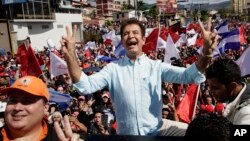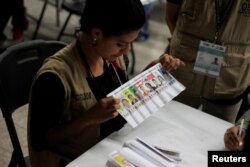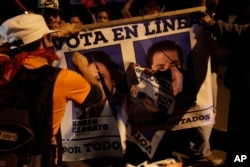Angry supporters of Honduran opposition candidate Salvador Nasralla blockaded some capital city streets with burning tires Monday, protesting what they contend is election fraud.
Nasralla called for a nationwide strike after a partial recount of votes cast two weeks ago in Honduras' presidential election ended Sunday with conservative incumbent Juan Orlando Hernandez holding a narrow lead. The winner has not yet been declared.
"The truth is that we have two people with a lot of support. It's a very competitive, tight election," said David Matamoros, who, as president of the Supreme Electoral Tribunal, is overseeing the hand count of votes in almost 5,000 ballot boxes from the November 26 election. They're being checked for irregularities.
Matamoros said the results Sunday were "extremely consistent" with earlier findings, with 43 percent for Hernandez, of the National Party, and 41.4 percent for Nasralla of the opposition Alliance Party.
Nasralla, a TV sportscaster who had an unexpected five-point lead for a time on election night, alleged misconduct in the review.
"They are implying that they are reviewing the votes," Nasralla told VOA. "... What they are reviewing are papers that Juan Orlando Hernández [had] put into the ballot box, but not on the actual day of the vote."
Recount demanded and recommended
Nasralla said he would not recognize the results, demanding a full recount.
The next step is for the elections tribunal to weigh an estimated 150 electoral challenges, according to the Associated Press. The tribunal has 30 days from the election to announce the result, giving it a December 26 deadline.
Matamoros told VOA that national and international observers' issues with verification "will be carried out so that there is no doubt whatsoever about who won."
Observers from the Organization of American States (OAS) last week issued a series of recommendations, including a recount of disputed ballots.
The United States' charge d'affaires for Honduras, Heidi Fulton, put out a statement repeating "our call for all involved in the electoral process to support a transparent, impartial, timely and peaceful determination of the election result, consistent with Honduran law, in a manner that maximizes citizen participation and represents the will of the Honduran people."
Fraud denial
The National Party's deputy, David Chávez, disputed accusations of fraud.
"We firmly believe that the process has been transparent.These organizations have been guarantors," Chávez said. He added that "the loser does not like to lose. And they do not have that democratic spirit. ...They have to be men when accepting defeat, and unfortunately this is not going to happen."
Thousands of protesters took to the streets Sunday in numerous cities to show support for Nasralla. Among them was Elsa Marina Lopez de Rivas, a 61-year-old homemaker marching in Tegucigalpa, the capital city.
"All of us who walk here are fighting for our votes, because we voted for President Salvador Nasaralla, we did not vote for Mr. Juan Orlando," Lopez said. "We no longer want [Hernandez] because he has done a lot of damage. We don't have security, we don't have employment, so we have to defend our votes here. "
Roughly two-thirds of the country's 9 million people live in poverty, according to the World Bank.
The Central American country is rife with violence and has one of the world's highest murder rates, Human Rights Watch observes.
At least 14 people have died in protests following the election.


